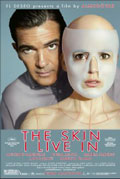
Directed by
Pedro Almodovar
117 minutes
Rated MA
Reviewed by
Bernard Hemingway

The Skin I Live In
Synopsis: A brilliant plastic surgeon Robert Legard (Antonio Banderas) specialises in skin transplants. After his wife dies in a car accident and his daughter commits suicide he immerses himself in a bizarre experiment in his private laboratory.Although in recent years he has concentrated on relatively “straight” dramas such as All About My Mother (2002) and Bad Education (2004), Almodóvar's return to the kind of kinky outlandishness that made his enfant terrible reputation in the 1980s is a marvel - The Skin I Live In is camp melodrama presented with the cinematic sophistication of one of the director's heroes, Douglas Sirk.
Despite its literary origins (it is based on a novel, Tarantula, by Thierry Jonquet) the plot is the stuff of B grade horror movies. Robert Legard is your archetypal mad scientist and his patient, Vera (Elena Anaya), your classic dungeon prisoner but there are no clanging doors and Caligarian histrionics here. Legard is calmly methodical and to all appearances as conventionally ordered as any successful bourgeois, a man driven by acute grief rather than madness in itself, though by all standards what he is up to is mad. The plot is convoluted and Almodóvar takes his time putting the pieces together so that we can begin to comprehend and empathise with the depth of Robert's pain. Banderas, who collaborated with Almodóvar many times in the early days of their respective careers, plays Legard with restrained sensitivity whilst another Almodóvar regular, Marisa Paredes, appears an old housekeeper, yet another genre type, the two being the epicentre around which the other characters revolve.
Although a film that lends itself to varied readings there are certain thematic constants with the rest of Almodóvar's work – notably the destructive dynamics of familial relationships and the social restriction of sexual identity. Both these themes are prominent in this film which realizes them masterfully in ways that are simultaneously seductive and repugnant.
The Skin I Live In is not a film for everyone. Men, in particular, may find it more than a little discomforting and those with a tendency to the moral right will experience a short season in Hell. But if you know and appreciate Almodóvar’s work, it is a gorgeously perverse triumph.

Want more about this film?


Want something different?




